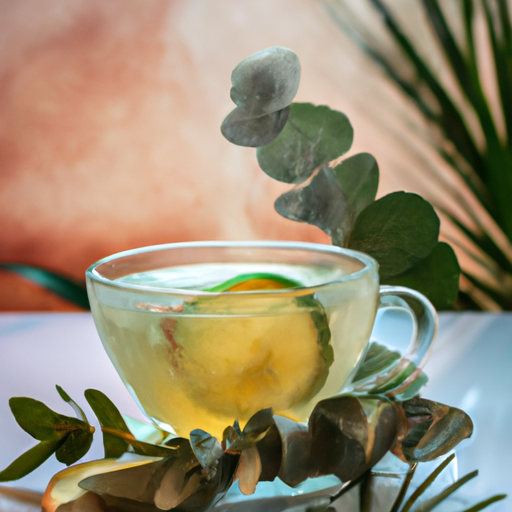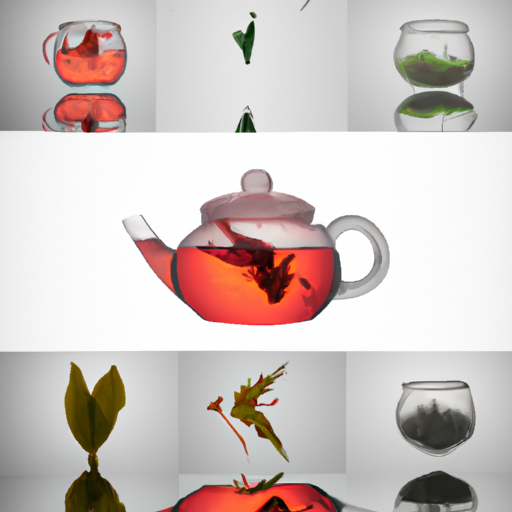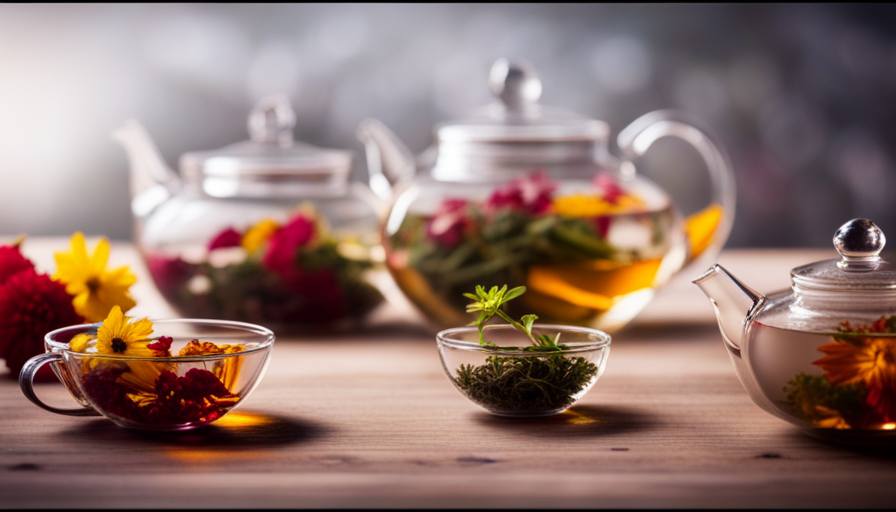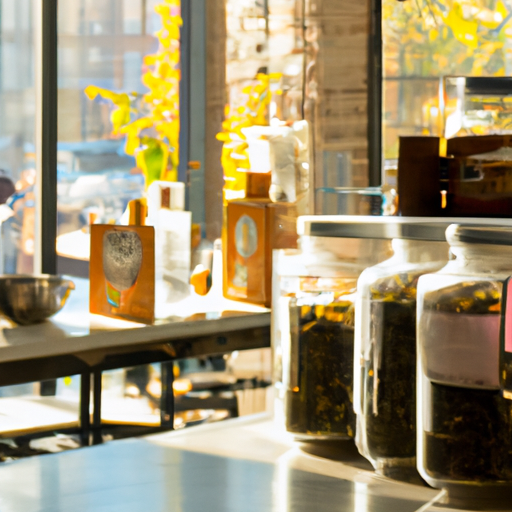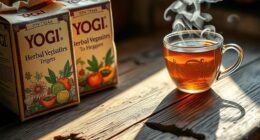Once in the past, I used to suffer from the common cold which would make me feel congested and miserable. However, I found that herbal tea has magical properties that help combat mucus and bring balance back to my body.
Nature has provided us with a glorious array of herbs that can work wonders in soothing our respiratory system and clearing out that stubborn mucus. From the refreshing minty goodness of Peppermint Tea to the warming and invigorating qualities of Ginger Tea, each herbal infusion offers its unique healing properties.
Eucalyptus Tea, with its aromatic essence, helps to loosen mucus and ease breathing, while Chamomile Tea’s gentle nature provides relief and relaxation. Licorice Root Tea, Lemon Tea, and Sage Tea also contribute their unique benefits in reducing mucus and supporting overall wellness.
Join me on a journey through the enchanting world of herbal teas and discover which one will become your ally in banishing mucus for good.
Key Takeaways
- Peppermint tea is effective in clearing mucus and soothing respiratory discomfort.
- Eucalyptus tea has antibacterial and anti-inflammatory properties, improves lung function, and helps clear mucus.
- Chamomile tea is anti-inflammatory, reduces mucus, and promotes relaxation.
- Licorice root tea can clear mucus and soothe the respiratory system, but excessive intake may have side effects.
Peppermint Tea
Peppermint tea, with its menthol properties, is the ideal choice for clearing excess mucus and soothing respiratory discomfort. The benefits of peppermint tea extend beyond just its refreshing taste. This herbal infusion has been used for centuries to aid digestion and promote overall wellness.
The menthol in peppermint tea acts as a natural decongestant, helping to break up mucus and alleviate congestion. It also has antispasmodic properties that can help relax the muscles of the respiratory tract, providing relief from coughing and wheezing.
Additionally, peppermint tea is known for its soothing effects on the digestive system, helping to relieve bloating, cramps, and indigestion.
As we transition to discussing ginger tea, another powerful herbal remedy, we find that it shares similar benefits in promoting respiratory health and soothing discomfort.
Ginger Tea
I love drinking ginger tea because it has amazing anti-inflammatory properties. It helps reduce inflammation in the body, which can be especially beneficial for respiratory health.
Not only that, but ginger tea also helps to clear the airways and improve overall respiratory health. It’s a natural and holistic approach to boosting immunity and maintaining a healthy respiratory system.
Anti-inflammatory Properties
Chamomile tea has been known to possess anti-inflammatory properties, making it an excellent choice for reducing mucus. When it comes to maintaining a healthy respiratory system, incorporating anti-inflammatory foods and natural remedies into your diet is essential. Here are three reasons why chamomile tea can help in this regard:
-
Reduces inflammation: Chamomile tea contains compounds that can inhibit the production of inflammatory chemicals in the body, helping to alleviate the symptoms of excess mucus.
-
Soothes irritation: The gentle nature of chamomile tea can help soothe the inflamed tissues in the respiratory system, providing relief from discomfort.
-
Boosts immune function: Chamomile tea contains antioxidants that can strengthen the immune system, helping to fight off infections and reduce mucus production.
By incorporating chamomile tea into your anti-inflammatory diet and natural remedies for inflammation, you can experience the benefits of reduced mucus and clearer airways.
Clears Airways
By indulging in a steaming cup of this aromatic beverage, you can feel the refreshing breeze of open air as your airways are cleared. Herbal teas, such as peppermint or eucalyptus, have been used for centuries to alleviate congestion and promote respiratory health. These natural remedies contain compounds that help relax the muscles in the airways, allowing for easier breathing. The menthol in peppermint tea acts as a decongestant, while eucalyptus tea has expectorant properties that help to loosen and expel mucus.
Not only do these teas provide relief from congestion, but they also support the body’s natural healing processes. By incorporating these herbal remedies into your daily routine, you can experience the benefits of clearer airways and improved respiratory health.
Transitioning into the next section, let’s explore how these teas can further enhance our overall well-being.
Improves Respiratory Health
Indulging in a cup of aromatic brew can do wonders for your respiratory health, improving the function of your airways and promoting easier breathing. When it comes to herbal teas that improve respiratory health, there are several options to consider.
One of the best choices is eucalyptus tea. Eucalyptus has been used for centuries to treat respiratory conditions due to its powerful antibacterial and anti-inflammatory properties. It can help improve lung function by reducing inflammation and clearing mucus from the airways.
Additionally, eucalyptus tea is known to boost the immune system, which can further support respiratory health. So, if you’re looking for a natural remedy to improve your respiratory health and promote easier breathing, give eucalyptus tea a try. It’s a refreshing and effective way to support your respiratory system.
Eucalyptus Tea
Eucalyptus tea, with its soothing aroma and powerful decongestant properties, is a fantastic choice for those looking to alleviate mucus and breathe easier. When it comes to improving respiratory health, eucalyptus oil benefits are well-known. By inhaling the steam from a cup of eucalyptus tea, you can help relieve congestion and clear your airways.
To make this refreshing tea, simply add a few drops of eucalyptus oil to a cup of boiling water and let it steep for 5 minutes. For added flavor and benefits, you can also add a squeeze of lemon and a teaspoon of honey. The combination of eucalyptus and these natural ingredients creates a soothing and effective remedy for mucus.
Now, let’s move on to the next herbal tea that can help with respiratory health – chamomile tea.
Chamomile Tea
Chamomile tea is a soothing herbal remedy that’s been used for centuries to calm irritated airways. It’s anti-inflammatory properties help to reduce inflammation in the respiratory system, making it an excellent choice for those suffering from mucus and congestion. Additionally, chamomile tea promotes relaxation and can aid in better sleep, allowing the body to heal and restore itself naturally.
Calms Irritated Airways
Soothe your sensitive airways with a steaming cup of comforting herbal tea. Chamomile tea has long been known for its calming effects and natural remedies. Here are three reasons why it’s the perfect choice for calming irritated airways:
-
Anti-inflammatory properties: Chamomile tea contains compounds that can help reduce inflammation in the respiratory system, providing relief for irritated airways.
-
Relaxation and stress reduction: Sipping on a warm cup of chamomile tea can promote relaxation and reduce stress, which can have a positive impact on your respiratory health.
-
Antioxidant effects: Chamomile tea is rich in antioxidants, which can help protect the respiratory system from oxidative stress and damage.
By incorporating chamomile tea into your routine, you can experience its calming effects and natural remedies for your irritated airways. This soothing herbal tea not only reduces inflammation but also provides a holistic approach to respiratory health.
Reduces Inflammation
As I discussed earlier, herbal teas can be incredibly beneficial for calming irritated airways. But did you know that they can also help reduce inflammation? This is especially important when it comes to mucus production and respiratory issues. By incorporating the right herbal tea into your routine, you can naturally soothe inflammation and minimize mucus production.
To give you a better idea of which herbal teas to try, I’ve created a helpful table below:
| Herbal Tea | Benefits |
|---|---|
| Peppermint | Relieves congestion and reduces inflammation |
| Eucalyptus | Acts as an expectorant, clearing mucus from the airways |
| Ginger | Has anti-inflammatory properties and aids in respiratory health |
| Chamomile | Soothes irritated airways and promotes relaxation |
| Turmeric | Anti-inflammatory properties that can help reduce mucus production |
By incorporating these natural remedies into your routine, you can find relief from respiratory issues and promote better overall health. And speaking of health, the next section will explore how herbal teas can promote relaxation for better sleep.
Promotes Relaxation for Better Sleep
If you’re looking for a natural way to unwind and get a good night’s sleep, incorporating the right herbal teas into your routine can work wonders. Herbal teas have long been used to promote relaxation and improve sleep quality.
One such tea that’s known for its calming properties is chamomile tea. Chamomile contains compounds that bind to certain receptors in the brain, helping to reduce anxiety and promote relaxation.
Another herbal tea that can aid in better sleep is lavender tea. Lavender has been used for centuries for its soothing scent and ability to induce relaxation. Research has shown that lavender can help improve sleep quality and reduce insomnia symptoms.
So, if you’re looking to wind down and improve your sleep, consider adding chamomile or lavender tea to your nightly routine.
Now, let’s move on to the next section about licorice root tea.
Licorice Root Tea
Licorice root tea is a great option for clearing up mucus and it’s like a cozy hug for your throat. Licorice root has been used for centuries for its medicinal properties and is known for its soothing effects on the respiratory system. It contains natural compounds that help to thin and expel mucus, making it easier to breathe and promoting overall respiratory health. Licorice root also has anti-inflammatory properties, which can help reduce inflammation in the throat and ease discomfort.
However, it’s important to note that licorice root should be consumed in moderation, as excessive intake can lead to side effects such as high blood pressure and low potassium levels.
Now, let’s transition into the next section about lemon tea, which is another herbal remedy that can help with mucus.
Lemon Tea
Lemon tea is a refreshing and invigorating herbal beverage that provides a boost of Vitamin C, which is essential for a healthy immune system. It not only helps to clear sinuses and relieve congestion, but also soothes throat irritation and promotes overall respiratory health.
I personally love starting my day with a warm cup of lemon tea, as it not only energizes me but also provides a natural remedy for any respiratory discomfort.
Provides Vitamin C
To boost your immune system and clear mucus, try sipping on a cup of hibiscus tea that’s packed with refreshing vitamin C. This delightful herbal tea provides immune support and boosts collagen production, helping your body fight off infections and promote healthy skin.
The vitamin C content in hibiscus tea acts as an antioxidant, protecting cells from damage caused by free radicals. It also aids in the production of collagen, a protein that supports the structure of tissues, including those in the respiratory system.
By nourishing your body with this natural remedy, you can find relief from mucus buildup and promote overall sinus health. So, let’s explore how hibiscus tea clears sinuses and brings you closer to a healthier, mucus-free life.
Clears Sinuses
Take a sip of this magical elixir, and watch as your congested sinuses clear up faster than a cheetah chasing its prey.
Herbal tea is a natural decongestant that clears nasal passages, providing relief from mucus buildup. The blend of herbs in this tea has been carefully selected to target the root cause of congestion, helping you breathe easier and feel refreshed. Eucalyptus, peppermint, and ginger are just a few of the ingredients that work together to open up your airways and promote sinus drainage.
With every sip, you’ll feel the soothing warmth of the tea as it works its magic.
And don’t worry, we’ll address that pesky throat irritation in the next section, so you can continue on your journey to wellness.
Soothes Throat Irritation
Ease that annoying throat irritation with a soothing sip of this magical elixir, and you’ll feel instant relief as it gently coats and calms your irritated throat. One of the best herbal teas for soothing throat irritation is sage tea. This nature-based remedy has been used for centuries to soothe dry cough and relieve hoarseness. Sage tea contains compounds that have antimicrobial properties, helping to reduce inflammation and fight off infections that may be causing throat irritation.
To better understand the benefits of sage tea, take a look at the table below:
| Benefits of Sage Tea |
|---|
| Soothes dry cough |
| Relieves hoarseness |
| Supports oral health |
Sage tea not only provides relief for your throat, but it also supports your overall well-being. Its holistic properties make it an excellent choice for those seeking natural remedies. Transitioning to the next section, let’s explore the wonders of sage tea for clearing mucus.
Sage Tea
With a sip of sage tea, the soothing aroma and warmth envelop me like a comforting embrace, gently loosening the grip of mucus. Sage tea has numerous benefits that can help alleviate throat irritation and clear mucus.
To make sage tea, simply steep a teaspoon of dried sage leaves in a cup of hot water for about 10 minutes.
Here are three reasons why sage tea is a great choice for soothing throat irritation and reducing mucus:
-
Antibacterial properties: Sage contains compounds that can help fight off bacteria, reducing the risk of throat infections that can contribute to mucus production.
-
Anti-inflammatory effects: Sage has anti-inflammatory properties that can help reduce swelling and irritation in the throat, providing relief from discomfort caused by excessive mucus.
-
Soothing and calming: The warm nature of sage tea can provide a soothing and calming effect on the throat, helping to ease irritation and promote overall comfort.
So next time you’re looking for a natural remedy to soothe throat irritation and reduce mucus, reach for a cup of comforting sage tea.
Frequently Asked Questions
How long should I steep peppermint tea to get the maximum benefit for mucus relief?
To maximize the benefits of peppermint tea for mucus relief, I steep it for around 5-7 minutes. Peppermint tea is one of the best herbal teas for mucus relief due to its natural decongestant properties.
Can ginger tea help with other respiratory symptoms besides mucus?
I researched the benefits of ginger tea and found that it can help with coughing and has other health benefits besides respiratory relief. It is a holistic, nature-based remedy that is evidence-informed.
Is eucalyptus tea safe to consume for children with mucus congestion?
Eucalyptus tea has numerous benefits, including helping with mucus congestion. It is safe for children when consumed in appropriate dosages. Consult a healthcare professional for guidance on the right amount for your child.
Are there any potential side effects of drinking chamomile tea for mucus relief?
Drinking chamomile tea for mucus relief can have potential side effects, but its effectiveness should not be overlooked. It’s important to consider individual sensitivities and consult a healthcare professional for a holistic approach to nature-based remedies.
Can licorice root tea be used as an alternative to over-the-counter mucus medications?
Licorice root tea can be a natural alternative to over-the-counter mucus medications. Its benefits include soothing respiratory tract, reducing inflammation, and thinning mucus. It is important to consult a healthcare professional for appropriate licorice root tea dosage.
Conclusion
In conclusion, herbal teas can be a wonderful natural remedy for mucus. Among the options discussed, peppermint tea is particularly effective in clearing congestion and reducing mucus production.
It’s been found that peppermint tea can help relieve symptoms of upper respiratory tract infections, such as cough, sore throat, and nasal congestion. So, next time you’re dealing with excess mucus, brew yourself a cup of soothing peppermint tea and experience the healing power of nature.
Embrace the holistic approach to wellness and let nature’s remedies be your guide.

